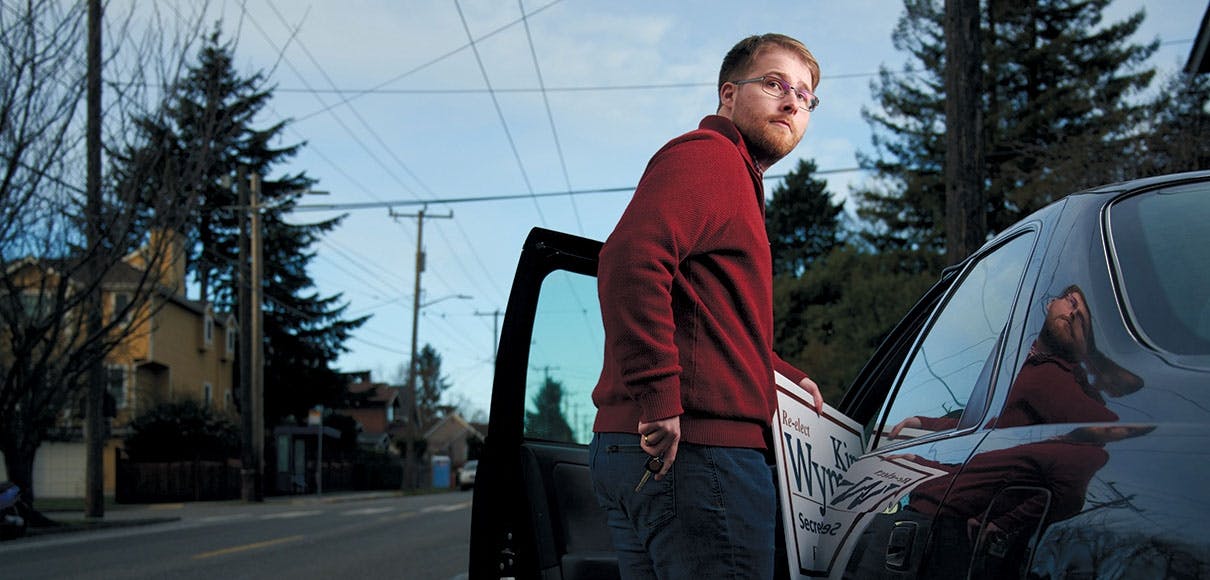In November 2016, Republican candidate Kim Wyman was re-elected as Washington Secretary of State after a hotly contested race.
Wyman was the only Republican to defeat a Democrat at the state level in the 2016 election in Washington state, defeating opponent Tina Podlodowski with 55 percent of the vote. As the results were announced, Wyman’s campaign manager, Andrew Bell ’16, breathed a sigh of relief. He was grateful not just for the victory, but also that the long days and nights of campaigning had come to an end. Or so he thought.
The Wyman-Podlodowski race marked Bell’s first time managing a campaign, and in the midst of seasoned politicians and career campaigners, Bell stood out. At 21 years old, he was still in his senior year of college at Seattle Pacific University when Wyman hired him. It was an extremely unusual move, according to Professor of Political Science Reed Davis, one of Bell’s professors. “College students don’t get hired as state-level campaign managers,” he said.
Bell, a political science and economics major, met Wyman through an internship with a King County councilmember, which he secured from SPU’s Mentor Program. After that first meeting, Wyman offered him the position of campaign manager. With two quarters of school left, Bell tackled the challenge of managing homework, finals, and a state-level campaign.
Bell discovered his love for politics in “Introduction to Politics” with Davis.
“He fostered an environment where everyone from the most liberal to the most conservative students could speak up about their viewpoints,” said Bell. “It painted a picture of what political life could be like, versus what we see in D.C. We poison a lot of what’s good in politics when we think of our opponents as evil. No matter our affiliation, our goal should be the same: serving people.”
 Davis appreciated Bell’s participation in class.
Davis appreciated Bell’s participation in class.
“He stood out as thoughtful and mature, analytical and extremely intelligent,” Davis said. “He also has a bipartisan spirit that’s virtually nonexistent in today’s political world.”
As a student, Bell counted conservative and liberal students among his closest friends. He co-led the Political Union with Bruna Afonso ’16.
“We were such polar opposites politically,” said Afonso. “We would get into arguments all the time, but have really great discussions, because it was rooted in friendship.”
Bell’s bipartisan spirit is what caught Wyman’s attention. “Andrew understood that the way to get things done is to work together toward common ground rather than falling into name-calling or divisiveness,” she said. “Our state and nation need calm people who understand how to sit down with people who disagree with them and have constructive conversations.”
As Wyman’s only full-time staff member, Bell supervised campaign volunteers, coordinated statewide communications, worked with the finance consultant, served as Wyman’s spokesperson, spoke at rallies, and acted as the main point of contact for the campaign.
“It was fantastic and exhausting, and at the end, I swore off working in politics,” he said.
But in September 2017, then-senator Dino Rossi announced his bid for Congress in Washington state’s 8th Congressional District. After hearing about Bell’s work with Wyman, he asked Bell to run his campaign. Bell dove into the whirlwind of another campaign, this time on a national level, as Rossi advanced from the top-two primary to face Democratic candidate Kim Schrier in the general election.
“We poison a lot of what’s good in politics when we think of our opponents as evil. No matter our affiliation, our goal should be the same: serving people.” — Andrew Bell
The Rossi-Schrier race proved one of the most expensive 2018 races for the U.S. House, racking up more than $25 million, funded primarily by an unprecedented cash flow from out-of-state political groups. The race received extensive media coverage and was hard-fought in a district that’s historically close. Ultimately, Schrier won with 52.4 percent of the vote.
As the hub of Rossi’s campaign team, Bell worked early mornings, late nights, and weekends juggling a large budget, media appearances, countless press calls and conferences, staff management, and an often unpredictable travel schedule. Bell compared the end of the campaign to suddenly jumping off a treadmill.
“One day you’re taking 10 calls an hour and answering hundreds of emails, the next it’s silent. You can invest everything into a campaign but it might not be enough. That’s why you need the anchors of family, faith, and values.”
Ready for a break from the rush of campaigning, Bell looks forward to marrying his fiancée this summer and moving to Colorado, where he plans to continue involvement in politics.
Though Bell is a political buff, he still recognizes the dark side of politics, especially when many find their identities in that arena.
“That’s an unhappy way to live,” he said. “Unlike God, every elected leader will let you down at some point. Treating politicians as heroes and villains is dangerous, because at the end of the day, they’re just human beings like us.”
Davis said students like Bell give him hope for the future of U.S. politics.
“We’ve had Democrat and Republican legislators come from SPU who are able to reach across the aisle because they have a shared faith and know there’s a purpose greater than politics,” he said. “That’s one of the great contributions SPU students can make: finding ways to reach common solutions. Even under the best of conditions that’s hard, but Andrew showed that it’s possible — even today.”




